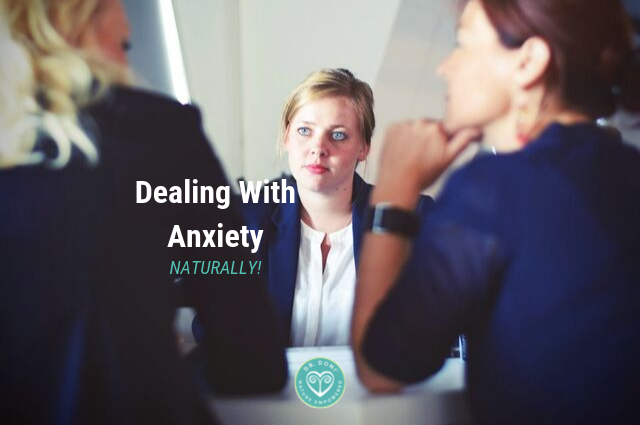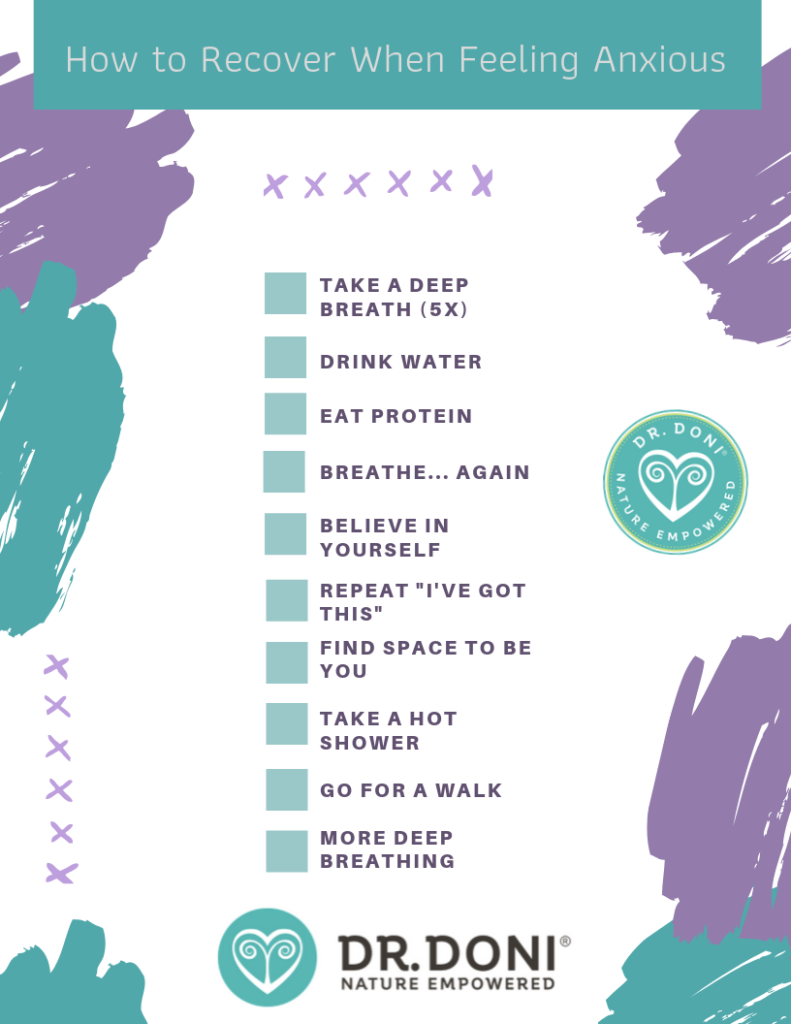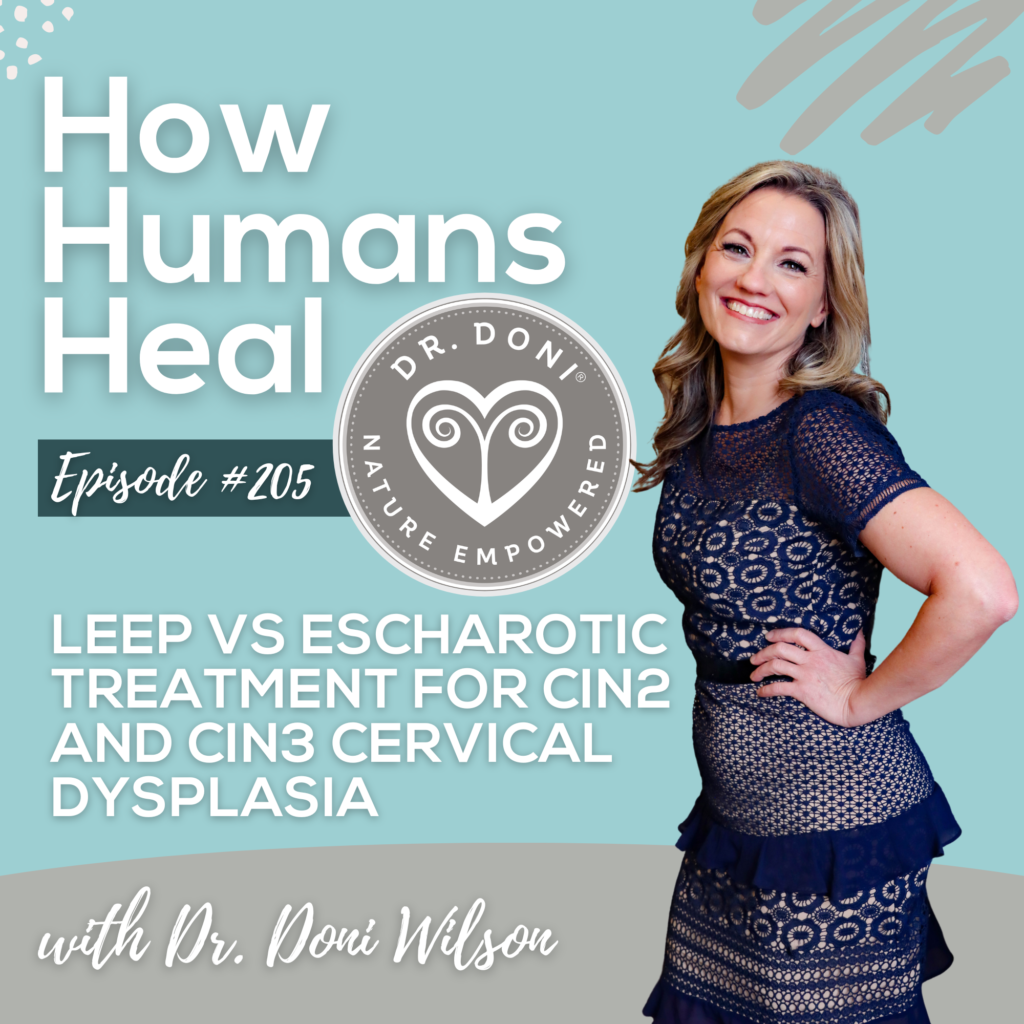
Dealing With Anxiety Naturally
- Home
- Stress & Adrenal Fatigue
- Dealing With Anxiety Naturally

Anxiety can occur not only from stress exposure, but from lifestyle or dietary triggers as well. Here’s how to recognize the signs and recover from anxiety.

Anxiety isn’t always what everyone thinks it is.
… It’s laying awake at night with rapid thoughts or fears racing through our brains.
… It’s waking up in a panic, immediately consumed with stress for the day.
… And it’s feeling overwhelm at seemingly simple, everyday tasks.
To some degree, stress is a constant in most people’s lives—but to what extent, how they handle it or how it paralyzes their thoughts and actions varies from person to person.
What Is Anxiety?
Anxiety is the body’s natural response to stressful situations. It’s important to note that anxiety and anxiety disorders are two different things. One is experienced in inconsistent and fleeting situations, while the other is a persistent fear or apprehension that remains for 6 months or longer at a time. An anxiety disorder can be categorized as a post-traumatic stress disorder (PTSD), obsessive-compulsive disorder (OCD), social anxiety disorders or other phobias.
Common Anxiety Symptoms Include:
- Sweating
- Fear
- Chills or Hot Flashes
- Shortness of Breath
- Feeling Dizzy or Light-Headed
- Dry Mouth
- Shaking
- Chest tightness or pain
For the sake of today’s discussion, we’ll be talking about anxiety as a whole that occurs frequently due to the stress exposure in one’s life.
Anxiety Attack: What Makes You Susceptible?
Overwhelmingly (no pun intended) it is our stress exposure that makes us more likely to experience bouts of anxiety. This can include current stress exposure in our lives—perhaps after a loss of a loved one or job—or even trauma as a child that bubbles up as anxiety in adulthood.
Stress exposure (along with our genetics related to stress response) shift the levels of our “stress hormones” – Cortisol and Adrenaline – made by the adrenal glands. When our bodies don’t have enough “anti-stress” to recover from stress, cortisol and adrenaline levels are left in what I refer to as “stress mode,” increasing the chances of stress-related symptoms such as anxiety attacks.
Cortisol and adrenaline levels can vary from person to person. At this point in time, you might have cortisol that is too high based on the time of day, and/or you may have adrenaline that is too high or too low. All of those possible variations can make anxiety more likely.
Other common susceptibilities to anxiety include:
- Suffering from lack of sleep.
- Having a diet too high in sugar or carbohydrates.
- Gluten intolerances – Celiac and Gluten Sensitivity.
- Going too long between meals (contrary to popular fitness fads, intermittent fasting can actually increase anxiety levels for some).
- Genetic variations such as:
- MTHFR: If your body is not converting folic acid to folate properly.
- COMT: Commonly people with COMT variations have higher adrenaline levels.
- MAO: Frequently associated with low serotonin and/or high adrenaline levels and high histamine.
- For more about MTHFR, COMT, and MAO, please see an earlier article of mine: MTHFR, Genetics, and Stress: A Recipe for Anxiety and Depression.
- Digestive issues such as leaky gut or an imbalance of the microbiome caused by medications, dietary factors, stress, etc.
- Inflammation – yes, anxiety in the nervous system is often caused by inflammation, often stemming from digestive issues and the gut-brain axis.
Treating Anxiety Naturally
Once you pinpoint what is making you more susceptible to anxiety, we can use relatively simple tests to determine a customized treatment plan. I frequently work with patients, both in my office and virtually, to help them understand their test results from:
- Food Sensitivity Panels: Which foods are triggering inflammations in the nervous system via the gut-brain axis?
- Neurotransmitter Panels: Measuring serotonin, GABA, dopamine, and adrenaline.
- Checking Cortisol Levels: Too high or too low can both cause anxiety.
- Stool Tests: Determining imbalances of bacteria making up the microbiome.
- Genetic Panel: Understanding how your genes play a role in your anxiety.
- Reading Blood Work: To determine if you are deficient in certain nutrients, how high or low your iron levels are and understanding your homocysteine (which points to your Vitamin B levels).
- Checking Thyroid Function: We know that having too high of levels can cause anxiety.
With the answers from these tests, we can determine if your anxiety could be reduced (or eliminated) by:
- Addressing nutrient deficiencies and leaky gut with enzyme support and my Leaky Gut Support so you get all the nutrients you need without the bad reactions. One capsule of enzymes and one teaspoon a day of powder can help heal your intestinal cells and eliminate inflammation in your gut and nervous system.
- Providing the right support for your genetic mutations: MTHFR may benefit from increasing folate (though it’s important to check your homocysteine levels because a flood of folate is counterproductive to decreasing anxiety); magnesium is beneficial for those with COMT.
- If we find something off with your neurotransmitter levels, we can use precursor nutrients such as 5HTP or use GABA (which I call a stress buffer) for calming support.
- If cortisol is elevated, we can use herbs* such as Ashwagandha and the nutrient phosphatidylserine, which has all been proven to decrease cortisol (stress response) levels and help the brain to recalibrate the necessary amount of cortisol production.
- Other treatments include hookworm therapy, probiotics (also now referred to as “psychobiotics”) or addressing the overgrowth of bacteria or yeast using herbs such as berberine.
And what about CBD?
Using CBD to Address Anxiety
In more recent years it has become increasingly common for patients to inquire about CBD for treatment of chronic health issues. CBD (cannabidiol) is a naturally-occurring substance present in many plants. For clinical use and over-the-counter access, CBD derived from hemp is often tried first. Studies show that CBD can be effective for anxiety, as well as many other health issues, such as pain, insomnia, seizure disorders, and dementia.
The CBD source people are more familiar with is cannabis. Cannabis or marijuana has recently become available in some states either recreationally (Oregon and Colorado for example) or with a medical license (New York and Connecticut for example). A cannabis plant is in fact made up of many different substances. The TWO we hear most about are CBD and the other is THC. THC is the substance responsible for psychotropic properties that causes a “high”; CBD on its own will not do that.
So in other words: CBD products are beneficial for relieving anxiety naturally – without the risk of “getting high.”
Instead it works inside the Endocannabinoid system, with anti-inflammatory and anti-anxiety properties. That’s right, along with our nervous system, immune system, and digestive system, we now know that our bodies have a built in cannabinoid system. Our bodies make cannabinoids, and we get them from plants. When we are under stress, our bodies are not as able to keep up with making cannabinoids, and that is when taking them from an external sources can be helpful.
CBD Dosage: What’s the Right Amount?
Unfortunately, this is not a one-size-fits-all type of treatment – though what is? Some may start with 1 milligram (mg) while someone else starts at 5 or 10 and works their way up. You can gradually increase your dosage until you find the dose that is effective for you. Effective doses in studies are between 30 and 100 mg per day, and for some health conditions (and under the oversight of a practitioner), doses of 150 to 200 mg can be used.
Ultimately CBD has been shown to help with anxiety, sleep issues, and physical pain.
You can buy CBD from hemp that I recommend to my patients once logging into the Dr. Doni Online Store or contact us by phone at 855.316.2114.
Remember, CBD and THC from Cannabis is regulated state to state, so you should always consult your local laws to see what is allowed or required to consume recreationally or medically.
Additional Support for Reducing Anxiety
The biggest thing I want everyone to take away from this today is that we are all human—and as such, subject to stress triggers and anxiety. Accepting that we WILL get stressed from time to time helps us to take a proactive approach to controlling our anxiety and getting back on track faster.
Work on building out time for yourself to simply BE; to have a break among the chaos of each day. Seems impossible, doesn’t it? I promise you it’s not. By consciously working towards voluntary “time-outs” for yourself to practice deep breathing, eat (don’t forget to eat!), or even go to the bathroom, you are cultivating positive “anti-stress” practices.
For more information about how I can help reduce your anxiety or the the tests I mentioned above, please check out my Adrenal Stress Recovery Program which includes neurotransmitter and food sensitivity panels and consultations with me to show you how to implement dietary and lifestyle changes.
You can also start with my Adrenal Recovery Guide (available at no cost) which walks you through an initial quiz about stress before giving you information about the underlying causes of stress and how to address it with herbs and nutrients.
Finally, you can also read my Stress Warrior book (https://doctordoni.com/product/dr-doni-s-stress-warrior-book-paperback/) and sign up for my FREE 7-Day Stress Reset.
–Dr. Doni
2nd October 2019
Save This Checklist!
*Please keep in mind that any and all supplements—nutrients, herbs, enzymes, or other—should be used with caution. My recommendation is that you seek the care of a naturopathic doctor (with a doctorate degree from a federally-accredited program) and that you have a primary care physician or practitioner whom you can contact to help you with individual dosing and protocols. If you ever experience negative symptoms after taking a product, stop taking it immediately and contact your doctor right away.
Share this Post:
Dr. Doni Wilson's Team
14 Day Detox Program
Take the Stress Type Quiz
Dr. Doni Social Media
Popular Posts


The 5 Burnout Types

Healing HPV Holistically: Dr. Doni on the Inspire Health by Jen Podcast

Recent Podcasts
Signup to receive our weekly newsletter with all the latest news, podcasts and special offers
New Book - Order Today!

SIMPLE PRACTICES for SHIFTING FROM YOUR STATE of STRESS to YOUR FLOW and FREEDOM
MASTER YOUR STRESS
RESET YOUR HEALTH
Order Now! Related Posts

What is making you susceptible to HPV?
I have been working with women who had abnormal cells on their cervix and/or vaginally, caused by HPV for over 20 years now. And while

The 5 Burnout Types
Did you know there are 5 burnout types? They are based on your Stress Type®, which is how your adrenal function has been affected by

Healing HPV Holistically: Dr. Doni on the Inspire Health by Jen Podcast
Dr. Doni was interviewed by Jen Ciszewski on the Inspire Health by Jen Podcast, talking about how to heal away HPV from your body for good.

Stress and Trauma: The Science Behind It, How It Shows Up and How to Heal: Dr. Doni on The Burn Fat and FEAST Podcast
Dr. Doni was interviewed by Sarah B. Thomas on the Burn Fat and FEAST Podcast, talking about the impact of stress and trauma on our health and what to do to recover from them.















